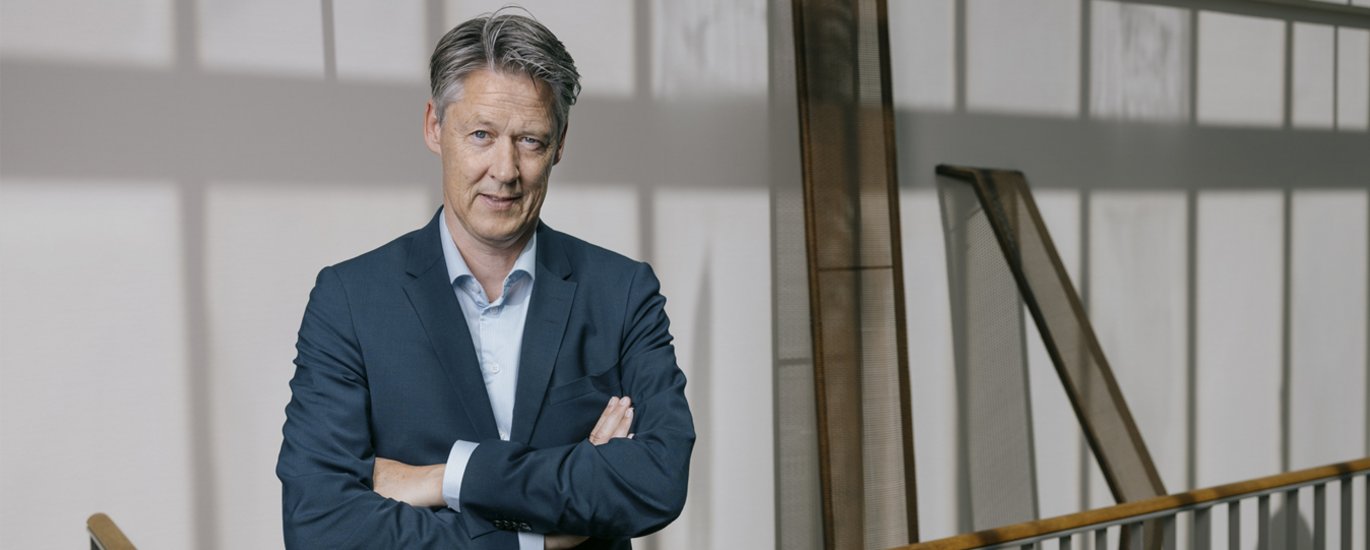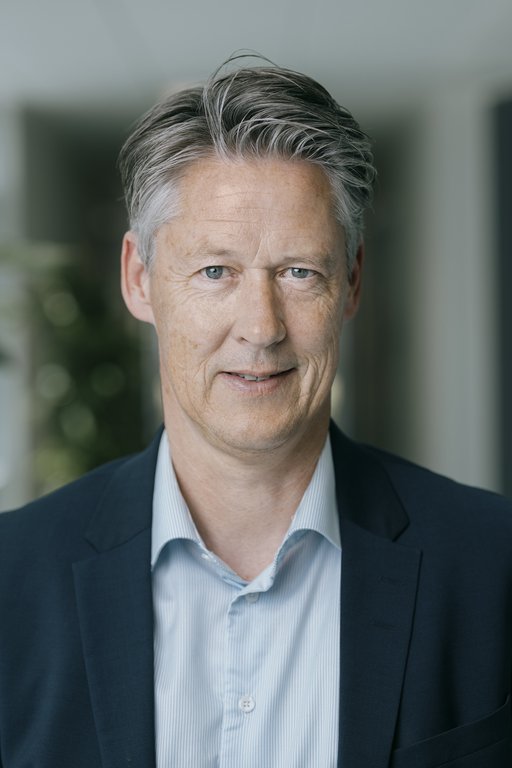Fiscal space. Remind me ... what exactly is it about?
This year’s Else Kai Sass Award goes to Professor of Economics Michael Svarer for his efforts over many years to make economics more understandable to the general public, politicians, business and industry in Denmark.

The evening news on DR on 23 June 2025: A man is standing in a perfectly ordinary Danish residential street. It is overcast but dry, and there is a slight breeze. A classic backdrop to an interview, as seen countless times before.
What’s special is that the man is standing next to a flipchart – a stand with large sheets of paper normally used for presentations, lectures and in classrooms. Here is it, in the middle of a residential street in Aarhus and used to explain to viewers what exactly the so-called fiscal space is all about. Earlier that day, Danish Finance Minister Nicolai Wammen had announced that the government was, for the fifth time, revising its expected tax revenues upwards, thereby increasing the government’s cash reserves for the period up until 2030.
The man explaining to viewers what that is all about is Michael Svarer, professor of economics at Aarhus University. Armed with a suitably large pen, he explains that high employment, rising returns in the stock markets from higher pension savings and larger corporate profits together generate more tax revenues for the state, which increases the economic leeway that politicians can use to finance, for example, increased defence spending, the green transition and a growing elderly population. And even though the handwriting on the flipchart is almost illegible, with a mixture of upper and lower-case letters and squiggles, after just one minute and 20 seconds you have grasped the essence of it.

Impassioned communicator
Michael Svarer is not only passionate about his work – researching solutions to economic problems. He is equally passionate about communicating his knowledge – for the benefit of society and us all. And the two things are inextricably linked, he emphasises.
“You have to be passionate about what you do in order to convey it effectively, and I love economics. People must sense that you’re really interested in what you’re doing, and I suppose that comes quite naturally to me. In any case, I enjoy communicating my research – in traditional research articles for journals, which are often pretty heavy-duty, in my teaching, which needs to be more lively, and in the media, where you have to keep things brief,” says Michael Svarer.
Erecting a flipchart in the residential street was the journalist’s idea, but one that was immediately embraced by Michael Svarer. As is his way, because he has been in the media so many times before and knows the game.
“For television, the editors can be pretty ruthless so you can’t be too vain about your work. After all, there’s an entertainment element to a lot of television. On P1 Morgen (DR radio programme, ed.), there’s usually time to delve a bit deeper, which is nice”, explains Michael Svarer.
If I’m asked and able to fit in an interview, I always say yes, because I believe that as researchers we have an obligation to communicate our knowledge outside the research community. This ultimately leads to better decisions
Professor in economics Michael Svarer
“Bravest man in Denmark”
Receiving the Else Kai Sass Award, which is Aarhus University’s Anniversary Foundation’s popular research communication award, is a huge honour.
“It’s a discipline I put a lot of energy into, and which is both fun and important,” he says.
During the five years that DM Akademikerbladet has published a list of the 50 most cited researchers in the media, he has been in the top 10, and in 2024 he was the second-most cited researcher in the Danish media, surpassed only by defence expert Peter Viggo Jakobsen.
“If I’m asked and able to fit in an interview, I always say yes, because I believe that as researchers we have an obligation to communicate our knowledge outside the research community. This ultimately leads to better decisions,” he says.
One of the main reasons for Michael Svarer’s high ranking among all the experts featured in the media last year was undoubtedly the fact that he headed and lent his name to a committee set up by the Danish government to propose possible scenarios for a carbon tax on agriculture.
When the Svarer Committee finally presented its report, Michael Svarer was not only very much in the media spotlight. He also ventured out to meet with some very angry farmers from Bæredygtigt Landbrug, a nationwide interest and trade organisation, to explain the various scenarios to them – prompting Peter Kjær, chairman of Bæredygtigt Landbrug, to call Michael Svarer the “Bravest man in Denmark”.
It is not only the media and thus readers, viewers and listeners who benefit from Michael Svarer’s ability to explain the key economic mechanisms that make modern welfare societies go round.
Business leaders, organisations and politicians often call on Michael Svarer when solutions to new economic issues have to be found or explanations given about how the economic world works.
Expert to the government
From 2013 to 2020, Michael Svarer was a member of the Chairmanship of the Danish Economic Councils. For the last four years, he even served as chairman of the council or chief economic advisor.
“It taught me to express my opinion on just about anything, because we had to analyse all kinds of different problems in all areas of society,” he says.
Still, it was something of a novel situation when the Covid-19 pandemic hit in 2020, with the lockdowns sending shock waves through the economy.
However, together with his fellow economics professors Torben M. Andersen and Philipp Schröder, Michael Svarer quickly came up with a model for how to develop a reopening strategy, and the government immediately embraced the idea, setting up an expert group with the three economists from Aarhus University and giving them six days to develop a strategy.
“As economists, we have a fundamental understanding of how the world works economically, and we have a language for analysing things. This meant that we soon agreed on what the problem was and how it could be solved. We were working round the clock, and it was incredibly interesting and motivating because what we were doing was so important. Afterwards, my wife said to me that she had never seen as happy as I was during the pandemic,” says Michael Svarer, who recently established the CEFAU centre at the Department of Economics together with Philipp Schröder.
Knowledge for business and industry
The centre will deliver independent economic research and analysis of long-term as well as current issues of specific relevance to Danish business and industry.
“With CEFAU, we’re bringing knowledge even closer to stakeholders in Danish business and industry, and it will be a completely new way of communicating and interacting with the outside world in a university context. The approach is slightly entrepreneurial, and it will be really exciting to see if it works,” says Michael Svarer.
The many students filling the classrooms and lecture halls of Aarhus University are another group benefitting from Michael Svarer’s communicative skills. Although he admits that teaching is becoming more challenging as time goes by.
“I feel an increasing gap between the new students and me each semester. But I try out new ways, and sometimes I succeed, and other times it doesn’t quite work out,” he laughs.
It was no coincidence that economics became Michael Svarer’s destiny.
“I really enjoyed maths at secondary school, so I was pretty sure I wanted to do something involving numbers at university. Pure mathematics was a little too technical, but economics seemed the perfect fit. Actually, I thought that I would end up doing business finance, like many of the others, because the economics lot were pretty nerdy. But I thought economics was both fun and exciting, so I became one of the nerds,” says Michael Svarer, hastening to add:
“But quite an outgoing nerd, of course.”
Read more about the Else Kai Sass Award (In Danish)